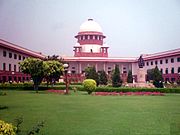The Supreme Court ruled on Wednesday allowing states to collect tax on lotteries operating in their territories. Since the lottery is now included in the category of "gambling and betting", it must be taxed through the state list.
The states of Karnataka and Kerala separately filed an appeal for taxing lotteries operating in states within its jurisdictions as well as private entities. They went for the top court as it was rejected in their own respective high courts earlier.
“In our view, the legislatures of the states of Karnataka and Kerala were fully competent to enact the impugned Acts and levy taxes on the activity of ‘betting and gambling’ being organized and conducted in the said respective States, including lotteries conducted by the government of India or the government of any state,” said MR Shah and BV Nagarathna, a bench of justices.
The Karnataka HC deemed the state has no legislative competence to pass the Karnataka Tax on Lotteries Act, 2004. They must then return the tax to the states they collected from including Nagaland, Arunachal Pradesh, Meghalaya, and Sikkim.
The Kerala HC also did not acknowledge the state’s Tax on Paper Lotteries, Act, 2005 back in April 20200 and August 2021.
“The tax imposed is on the ‘gambling’ nature of lotteries, which field is covered in its entirety under Entry 62 of List II (State List) and the power to impose tax under this Entry extends in relation to lottery of every kind, with no distinction as to the entity organizing the same,” said Justice Nagarathna, who wrote 122-page judgment for the bench.
The bench said Entry 62 of List II allows the state legislature to levy taxes if they allow lottery activities in their states.
“Thus, ‘betting and gambling’ is a state subject except to the extent of it being denuded of its powers insofar as Entry 40 of List I is concerned (which relates to regulation of lottery schemes where Parliament will have competence).”
Opposing States
Several states opposed Kerala and Karnataka of applying taxes on lotteries. They said the policy is against the principles of “federalism and inter-governmental immunity”.
The bench explained, “What is being taxed is a gambling activity which is squarely covered under Entry 34 of List II and not on lottery per se conducted by Government of India or Government of a State…Therefore, the state legislature has the competence to tax lottery scheme which is gambling being conducted not only by the Government of India or the government of any state or by any other agency or instrumentality of a particular state but also by a private entity within the state.”
As the Court pointed out, List I (Union List) does not contain any specific entries for taxes on betting and gambling, since these are specifically defined in State Lists.
“Thus, Entry 62 of List II gives legislative competence to a state legislature to levy a tax on betting and gambling.”



